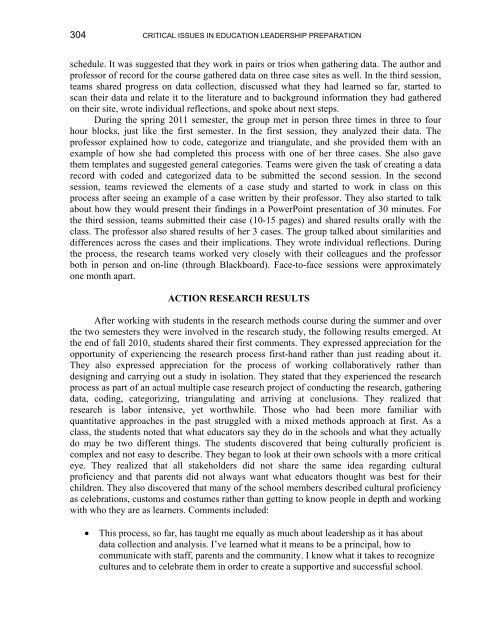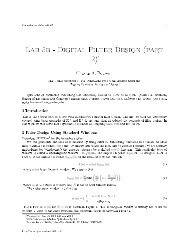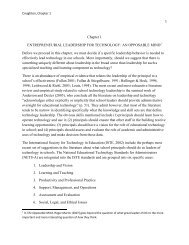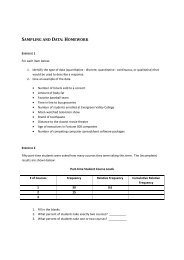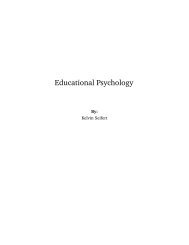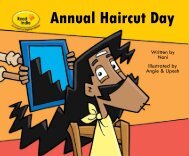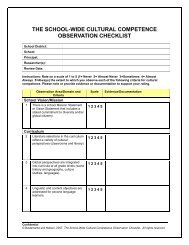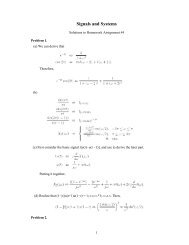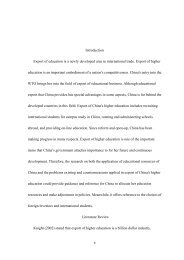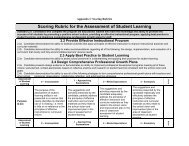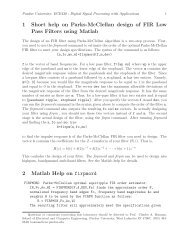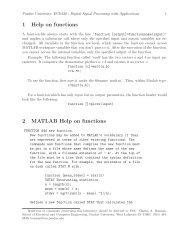Blazing New Trails - Connexions
Blazing New Trails - Connexions
Blazing New Trails - Connexions
Create successful ePaper yourself
Turn your PDF publications into a flip-book with our unique Google optimized e-Paper software.
304 CRITICAL ISSUES IN EDUCATION LEADERSHIP PREPARATION<br />
schedule. It was suggested that they work in pairs or trios when gathering data. The author and<br />
professor of record for the course gathered data on three case sites as well. In the third session,<br />
teams shared progress on data collection, discussed what they had learned so far, started to<br />
scan their data and relate it to the literature and to background information they had gathered<br />
on their site, wrote individual reflections, and spoke about next steps.<br />
During the spring 2011 semester, the group met in person three times in three to four<br />
hour blocks, just like the first semester. In the first session, they analyzed their data. The<br />
professor explained how to code, categorize and triangulate, and she provided them with an<br />
example of how she had completed this process with one of her three cases. She also gave<br />
them templates and suggested general categories. Teams were given the task of creating a data<br />
record with coded and categorized data to be submitted the second session. In the second<br />
session, teams reviewed the elements of a case study and started to work in class on this<br />
process after seeing an example of a case written by their professor. They also started to talk<br />
about how they would present their findings in a PowerPoint presentation of 30 minutes. For<br />
the third session, teams submitted their case (10-15 pages) and shared results orally with the<br />
class. The professor also shared results of her 3 cases. The group talked about similarities and<br />
differences across the cases and their implications. They wrote individual reflections. During<br />
the process, the research teams worked very closely with their colleagues and the professor<br />
both in person and on-line (through Blackboard). Face-to-face sessions were approximately<br />
one month apart.<br />
ACTION RESEARCH RESULTS<br />
After working with students in the research methods course during the summer and over<br />
the two semesters they were involved in the research study, the following results emerged. At<br />
the end of fall 2010, students shared their first comments. They expressed appreciation for the<br />
opportunity of experiencing the research process first-hand rather than just reading about it.<br />
They also expressed appreciation for the process of working collaboratively rather than<br />
designing and carrying out a study in isolation. They stated that they experienced the research<br />
process as part of an actual multiple case research project of conducting the research, gathering<br />
data, coding, categorizing, triangulating and arriving at conclusions. They realized that<br />
research is labor intensive, yet worthwhile. Those who had been more familiar with<br />
quantitative approaches in the past struggled with a mixed methods approach at first. As a<br />
class, the students noted that what educators say they do in the schools and what they actually<br />
do may be two different things. The students discovered that being culturally proficient is<br />
complex and not easy to describe. They began to look at their own schools with a more critical<br />
eye. They realized that all stakeholders did not share the same idea regarding cultural<br />
proficiency and that parents did not always want what educators thought was best for their<br />
children. They also discovered that many of the school members described cultural proficiency<br />
as celebrations, customs and costumes rather than getting to know people in depth and working<br />
with who they are as learners. Comments included:<br />
This process, so far, has taught me equally as much about leadership as it has about<br />
data collection and analysis. I’ve learned what it means to be a principal, how to<br />
communicate with staff, parents and the community. I know what it takes to recognize<br />
cultures and to celebrate them in order to create a supportive and successful school.


